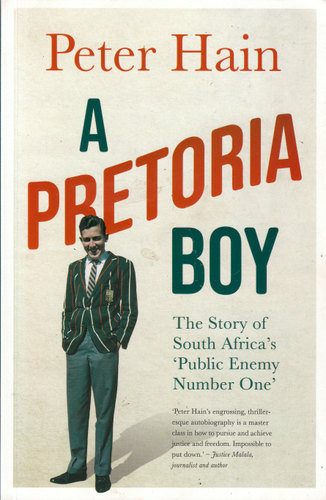
Published by Jonathan Ball Publishers
With the benefit of hindsight, it is strange to think that there was a time when the mere mention of the name ‘Peter Hain’ was enough to send the average sports-loving, white South African into an apoplectic fit. Reading his well-written, unflinchingly candid memoir, however, certainly brings it all back home.
From the start, Hain was nothing but contrary. Both of his parents were active members of the South African Liberal Party and as a young schoolboy, growing up in Pretoria, he found himself rubbing shoulders with the likes of Allan Paton and other such luminaries. Inspired by their core principles and selfless example, he rebelled against the country’s official policies at an early age learning, in the process, what it was like to live under constant state surveillance.
Later, Hain’s fierce opposition to Apartheid would see him become not only an irritating thorn in the flesh of the National Party government but also a loathed figure in the eyes of a large portion of their supporters (and a few liberals as well), who saw him as nothing more than a grandstanding, young upstart.
In 1963 Hain’s parents were served with a five-year banning order which restricted their movements and prevented them from entering certain areas. Faced with a ruthless regime that crushed all peaceful protest, many other anti-Apartheid activists began calling for a rethink of tactics. Hain’s parents, however, remained steadfast in their commitment to change through non-violent means but their close friendship with the Johannesburg station bomber, John Harris, brought them under increasing scrutiny by the country’s security services. They were harassed to the point where his father was unable to find employment and although reluctant to do so his family were eventually forced to leave the country.
Exiled to Britain, Hain did not forget his roots nor his steadfast opposition to the South African government and its policies. Mad about sport himself, he knew only too well how important this was to the white South African sense of self. He began organising militant campaigns in the UK against touring South African rugby and cricket sides as his contribution to the struggle. It had the desired effect. In no time Hain found himself dubbed ‘Public Enemy Number One’ by the South African media.
As successful as his tactics were they did not go unchallenged. In 1972 he was hauled before the court on conspiracy charges in a trial that would become something of a cause celebre. After that got thrown out, he would be maliciously framed for a bank robbery. Behind all of this, he sees the malignant hand of the South African Bureau of State Security (BOSS) – with some assistance from elements within MI5 – who wanted to both discredit and neutralise him.
With the release of Nelson Mandela from Victor Verster prison on 11th February 1990, the public perception of Peter Hain underwent a startling metamorphosis. No longer the despised young firebrand of yore (‘Hain the Pain’), his formerly controversial views now became part of – in his words – ‘mainstream opinion.’ To his bemusement, he even had people apologising to him for previously dismissing him as nothing more than a troublemaker.
A career in British politics followed, culminating in him becoming a minister in the Labour government and then getting elevated to the House of Lords.
Wishing only what is best for the country of his birth, Hain has remained true to the values his parents instilled in him. When President Jacob Zuma’s malfeasance was becoming harder and harder to ignore he returned to South Africa and at the behest of several senior ANC members went on to use British Parliamentary privilege to expose the extent of the looting and money laundering. He also testified against Zuma and the Gupta brothers before the Zondo Commission. Nor did he confine his condemnation of wrongdoing to South Africa. As Britain’s Africa minister, he publicly castigated President Robert Mugabe of Zimbabwe for betraying the ideals of democracy and human rights they had both ostensibly fought for.
Part autobiography, part history primer, A Pretoria Boy serves as a salutary reminder, at a time when memories of those dark days have taken on a rosier tint, of just how grim and brutal life was under a regime that used fear to mould human behaviour and where people could be driven into exile – or, in some cases, killed – for expressing dissenting beliefs.
Although Hain displays little rancour or ill will towards his one time adversaries, his book will make uncomfortable reading to many of those he holds to account across the political spectrum.